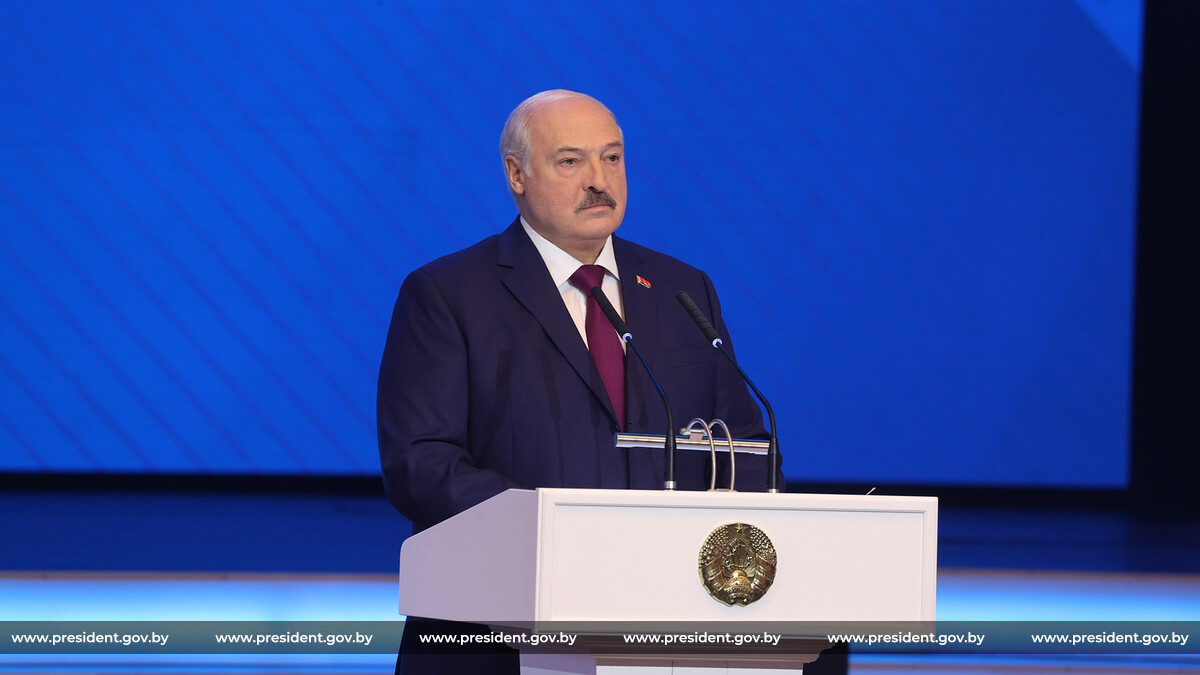Lukashenka threatens the West with a migration crisis, a “nuclear guillotine” and Prigozhin
 The situation got worse
The situation got worse

The Belarusian regime continues its strategy of “escalation for de-escalation”. Threats, in the form of a migration crisis, the deployment of Russian nuclear weapons, and the relocation of the Wagner PMC to Belarus are used in an attempt to force Western capitals to negotiate on Minsk’s terms. The regime is attempting to use the Vatican as a confidential channel to the West, still aiming to achieve an honourable role as a mediator and venue for negotiations between Ukraine and Russia after the end of the war.
Lukashenka used an Independence Day meeting to convey several contradictory indications to the West. On the one hand, he said he had approved a list of Western “decision-making centres” on military maps as targets for tactical nuclear weapons (TNW) strikes and warned that Western politicians would place Europe under a “nuclear guillotine” if they continued on a confrontational course.
On the other hand, Belarus and Europe should develop together, especially considering common problems, including energy, access to resources (including labour), demographics, and the growth of extremism and cybercrime. In this regard, the Belarusian government has been instructed to develop a plan of good neighbourliness.
At the same time, Lukashenka again threatened Eastern Europe with migration crisis as attempts by illegal migrants to cross the Belarusian-Polish border reached record levels in June. Minsk believes that accusations of exploiting the situation are unreasonable and EU border agencies are to blame due to their refusal to cooperate with Belarus in the regulation of migration. Alleged EU-initiated blocking of cooperation untied the hands of traffickers, including in the EU.
Although Lukashenka continues to reassure Belarusians about the relocation of Wagner PMC to Belarus, he admitted that his decision caused a “wave of calls” from Western capitals. Warsaw suspects that Prigozhin may now engage in various provocations directed against Lithuania on the eve of the NATO summit in Vilnius, where the relocation of the Wagner PMC to Belarus and the deployment of nuclear weapons will be discussed at the initiative of Warsaw.
The United States intends to seek the extradition of Prigozhin, creating an additional point of tension between Minsk and Washington, adding to Minsk’s assistance to Ukrainian oligarch, Dmytro Firtash, who seeks to avoid extradition to the United States with the help of a Belarusian diplomatic passport. Since 2021, Firtash has been an adviser to the Permanent Mission of Belarus to international organisations in Vienna, in particular the United Nations Industrial Development Organization (UNIDO).
Following a meeting on June 29th, the European Council approved conclusions on the situation in Ukraine. In the document, the leaders of EU states once again expressed their intention to support Ukraine militarily and condemned the destruction of the Kakhovka hydroelectric power station, which, among other things, poses an additional threat to the Zaporizhzhia nuclear power plant. The conclusions of the European Council also mention Belarus in the context of the deportation of Ukrainian children and military support to Russia in the war against Ukraine. The document calls for to Belarus to stop allowing the Russian Armed Forces to use their territory, including deployment of tactical nuclear weapons.
In Brussels, EU High Representative for Foreign Affairs and Security Policy Josep Borrell inaugurated a new Advisory Group between the European Union and Belarusian Democratic Forces. Acting as a platform for dialogue between the EU and representatives of Belarusian civil society, the Advisory Group will ensure the exchange of information on the situation in the country and help shape further EU action in support of a free, sovereign, and democratic Belarus.
Among the topics discussed at the first meeting of the Belarus-EU Advisory Group were the threat to Belarus from the Russian armed forces, the possible arrival of the Wagner PMC, and the deployment of Russian nuclear weapons. Particular attention was paid to the “Passport of the New Belarus” project which is being developed by the United Transitional Cabinet. Leader of the Belarusian Democratic Forces Sviatlana Tsikhanouskaya proposed appointing an EU special representative for Belarus.
At a meeting with the President of the European Council, Charles Michel, the parties discussed the military-political situation in Belarus the arrival of Prigozhin and Wagner PMC, the deployment of tactical nuclear weapons, and the consequences for regional security.
Deputy head of the United Transitional Cabinet and head of the People’s Anti-Crisis Management, Pavel Latushka, submitted evidence of war crimes (illegal transfer of Ukrainian children) committed by Lukashenka, Dmitry Mezentsev, Ivan Golovaty, Alexei Talai and Olga Volkova to the International Criminal Court in The Hague.
Meanwhile, Minsk is communicating with the West via the Vatican. Foreign Minister Sergei Aleinik met with the papal legate Archbishop Claudio Gugerotti to discuss the current situation in the Eurasian region and the wider world and cooperation between Belarus and the Vatican in multilateral and bilateral contexts.
The meeting took place following the visit of the Papal Envoy for the settlement in Ukraine, Cardinal Matteo Maria Zuppi, to Moscow, dedicated to the promotion of peace talks between Ukraine and Russia. Belarus has ambitions to become the venue for these negotiations after the end of the war and hopes for the support of the Vatican in this matter.
Subscribe to our newsletter




Situation in Belarus
Constitutional referendum: main consequences


 Video
Video
How to count the political prisoners: are the new criteria needed?


 Video
Video
Paternalism In Decline, Belarusian Euroscepticism, And The Influence Of Russia


 Video
Video












